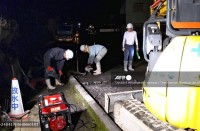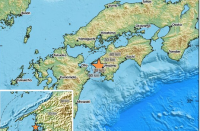JERUSALEM, Israel (Reuters) — A safe zone should be set up for displaced Syrians camping on the Syrian border with the Israeli occupied Golan Heights, the leader of a Syrian-focussed charity and a leading Syrian opposition figure said on Thursday (February 18).
There is a growing encampment in the area where civilians fleeing the five-year Syrian conflict have been gathering.
American-Israeli businessman and founder of the Amaliah charity, Moti Kahana, and Syrian politician, Kamal al-Labwani, told reporters in Jerusalem of their plans.
“We like to be a good neighbour, we would like to increase humanitarian supply, we do think a safe zone next to the Israeli border is the right thing to do and we will help you to achieve that goal,” Kahana said.
Amaliah is a charity which says it aims to empower civil society and women in the Middle East.
Kahana and Labwani have been leaning on Israel, the United Nations and European Union to set up the safe zone.
Al-Labwani said: “The government of Israel get (gives) help through the borders, humanitarian help, and treats the injured people but now we need more; we need to create inside Syria a safe zone, safe zone for civilians to help them to have ability to rebuild their society.”
White tents being erected between the Syrian and Israeli-held lines on the Golan Heights frontier may signal quiet preparations to accommodate a potential southward surge of refugees.
The two-dozen tents can easily be observed from the nearest Israeli settlement on the Golan, Alonei Habashan, which is located a few dozen metres (yards) away over the demarcation fence that was laid down after the 1973 Middle East war.
A resident from Alonei Habashan, Dubi Hadar, said: “This refugee camp emerged as a result of the Syrian civil war. Eventually, Syrians who had nowhere else to flee to arrived here. Lately, the camp became much bigger. This is the place where people can live their lives away from the war because here it is quiet.”
He added: “We trust the military, as far as we’re concerned, whatever the army permits is OK; the army is doing its job well.”
An Israeli official briefed on Syria policy and who spoke to Reuters on condition of anonymity said that Israel was not prepared for any significant increase in numbers from the hundreds of civil war casualties it has brought in through the Golan for treatment in recent years.
Those admissions have caused friction between Israeli authorities and minority Druze Arabs in Israel or the Israeli-held Golan, who suspect some of the casualties belong to jihadi groups that have fought their brethren in Syria.







